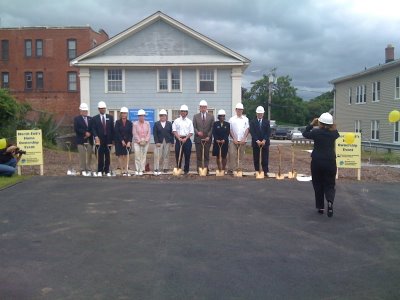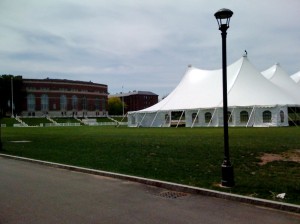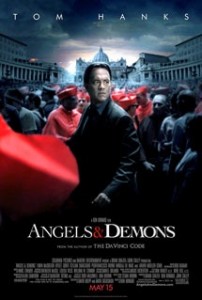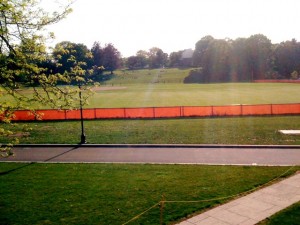How many times do professors hear “how lucky you are to have the entire summer off!” Off? As August has replaced July and the Wesleyan “summer send offs” are well underway, my colleagues and I can hear in the distance the hum of the oncoming semester growing louder and louder. How are we likely to react? Read more, write more, recalibrate that experiment or crunch those numbers! Summer is an essential time for faculty to make progress on the research that often plays a key role in the courses they will be teaching.
Kari and I have been away from campus for a few weeks now, and we often hear from friends how important it is to “take time and relax.” Sure, but we both also have book contracts and spend every day reading and writing (and rewriting!) in hopes of making progress on the manuscripts. She is critically exploring how writers and philosophers have re-framed “the animal” so as to describe what “the human” might be with the goal of reconceptualizing how humans and non-human animals might relate to one another. I am wrestling with how photography has changed the ways we make sense of the past. Both of us will use the research we are doing now in the classes we will teach this fall.
Intensive summertime research is very common at Wesleyan. Historian Phil Pomper, with whom I studied when I was an undergrad, is in the office daily writing a biography set in the Russian revolutionary period, philosopher Lori Gruen is completing a book on animal morality, while German Professor Krishna Winston (whose translation of Werner Herzog’s memoir was twice recently reviewed in the New York Times) has multiple translation assignments underway. Chemist Stew Novick leads an amazingly prolific team studying “exotic molecules” with microwave spectroscopy that can create super low temperatures. Having just finished her term as Chair of FGSS, Jennifer Tucker, is putting the finishing touches on a volume about photography and history, while the indefatigable Jeanine Basinger writes a new book on marriage in the movies. Biologist Dave Bodznick can be found at the Cape for a good part of the summer, but that’s because he has a lab at the Marine Biological Laboratory Woods Hole where he studies the electroreceptors in skates. French Professor Andrew Curran has been finishing his book on concepts of race in the 18th century, while sociologist Alex Dupuy is doing research on parallels and disconnections between key figures in the American and Haitian revolutions. Finally, COL Director Ethan Kleinberg explores the concept of forgiveness in his book about French philosopher Emmanuel Levinas.
I should probably ask forgiveness for leaving out scores of faculty research projects in this tiny sample! But I trust this gives some small idea of how faculty are actively advancing their fields in ways that will come back to inform the classroom.
Ah, the sun will soon be setting on another beautiful summer day… so I better get back to work!
[tags]summer, Kari Weil, research, professors, Phil Pomper, Lori Gruen, Krishna Winston, Stew Novick, Jennifer Tucker, Jeanine Basinger, Dave Bodznick, Andrew Curran, Alex Dupuy, Ethan Kleinberg[/tags]



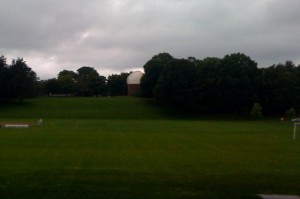 As is often the case, as we think about new programs we are also reminded of our past. In the final days of the fiscal year Wesleyan was the beneficiary of a significant bequest. John Pallein graduated with an English major in 1950, and spent the next two years in the US Army, serving in Japan and Korea. He began working as a technical writer, first for Pratt and Whitney and later for Beckman Instruments. I met John in California just before I moved back to Middletown, and it was clear that he felt a strong loyalty to alma mater. We talked about his work in the President’s House for Victor Butterfield’s family, and his enthusiasm about recent Wes students he had met. A gentle and amiable person, we spoke about the difficulties of leaving the West Coast after so many years. John had settled in one of the most beautiful spots I’d ever seen, Dana Point, but it was clear that Middletown was a locus of cherished memories for him. John’s bequest of more than $3 million will endow financial aid packages for Pallein Scholars in perpetuity, so that deserving students can also have access to the kinds of transformative educational experiences that served him so well.
As is often the case, as we think about new programs we are also reminded of our past. In the final days of the fiscal year Wesleyan was the beneficiary of a significant bequest. John Pallein graduated with an English major in 1950, and spent the next two years in the US Army, serving in Japan and Korea. He began working as a technical writer, first for Pratt and Whitney and later for Beckman Instruments. I met John in California just before I moved back to Middletown, and it was clear that he felt a strong loyalty to alma mater. We talked about his work in the President’s House for Victor Butterfield’s family, and his enthusiasm about recent Wes students he had met. A gentle and amiable person, we spoke about the difficulties of leaving the West Coast after so many years. John had settled in one of the most beautiful spots I’d ever seen, Dana Point, but it was clear that Middletown was a locus of cherished memories for him. John’s bequest of more than $3 million will endow financial aid packages for Pallein Scholars in perpetuity, so that deserving students can also have access to the kinds of transformative educational experiences that served him so well.